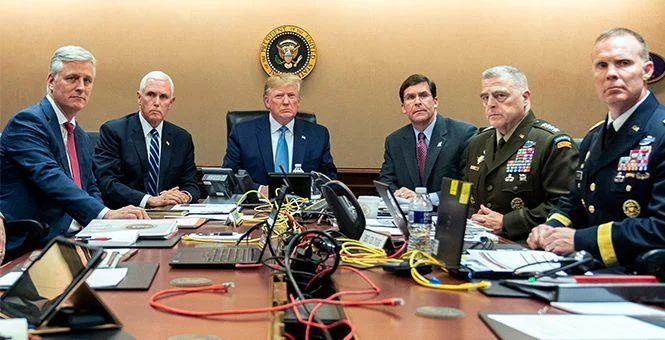Trump’s boring national security record By Austen D. Givens
The 2020 election year has arrived, and with it, a slate of fresh national security challenges for the United States. Groups of Iranian-sponsored agitators broke into the U.S. Embassy compound in Baghdad. The United States responded by killing Qassim Suleimani, the head of Iran’s Revolutionary Guard Corps, a U.S. State Department-designated terrorist organization. Meanwhile, North Korea announced that it would no longer self-impose limitations on its ability to test nuclear weapons or launch intercontinental ballistic missiles. And the Russian government let it be known that it is deploying its first batch of hypersonic missiles, which can fly to any point on the globe in minutes and cannot be intercepted by any existing anti-missile technology. So, it would seem a good time to survey the Trump administration’s major decisions and initiatives in national security to date. And in doing so, one is struck by just how normal, when compared with past administrations, the Trump White House’s conduct has been.
The surprising truth about the Trump administration is that, at least on national security and defense matters, the primary differences between this administration and recent past administrations have not been tangible, measurable behaviors—the killing of Qassim Suleimani being a recent and notable exception. The main points of departure have instead been rhetorical. Where Trump uses ALL CAPS and exclamation points in describing national security policy, his predecessors chose proper capitalization and periods. Yet it is there, in the packaging itself, that the big differences end. Heading into the November 2020 Presidential election, the Republican Party is gearing up to market a presidential candidate whose actual national security track record is in line with the Obama, George W. Bush, Clinton, and George H.W. Bush administrations’ records.
Photo by Getty
For example, the Trump administration has expanded the use of offensive cyber warfare capabilities that were first used during the Obama years. Throughout Trump’s first year in office, a large number of North Korean missiles blew up on their launch pads or shortly after takeoff. These mysterious explosions were probably attributable to a secret Obama-era program to hack and sabotage the missiles before they were operational. Trump then went even further, signing a classified directive in mid-2018 that gives the U.S. armed forces new flexibility to counter cybersecurity threats.
Or take NATO. The main criticism of the Trump White House’s approach to NATO has been that the United States is somehow pulling back from the alliance by demanding that more member states increase their own defense spending. But the reality is that such spending increases by NATO member states were in the works for years. An analysis by Foreign Policy magazine found that European member states have been increasing their defense budgets since the Obama administration. Putting aside Trump’s fiery rhetoric about NATO members’ reluctance to spend, his demands for more burden sharing are less a departure from past practice and more a call for members to continue Obama administration-era defense funding bumps.
Photo by Kevin Lim/Getty
Or consider Iran and North Korea. Trump’s combination of financial incentives and penalties in dealing with each nation is in line with the Obama, George W. Bush, and Clinton administrations’ approaches to these states. Yes, the Trump administration has tightened crushing economic sanctions on both nations. But sanctions are not new. The George H.W. Bush administration began to get the North Koreans to stop their pursuit of nuclear weapons by working in concert with the South Korean government to apply diplomatic pressure. The Clinton White House relaxed sanctions on North Korea in a bid for the nation to relinquish its nuclear weapons in 1999. And the George W. Bush administration tried to lure Iran to the negotiating table with a mixture of financial incentives and penalties.
How about Israel? President Trump’s decision to move the U.S. embassy from Tel Aviv to Jerusalem was seen as controversial. Presidents Clinton and George W. Bush each made noises about relocating the U.S. embassy from Tel Aviv to Jerusalem during their respective campaigns for the White House. Unlike Trump, however, they did not follow up on their pledges once they assumed office.
Photo by Getty
Let’s turn to perhaps the most controversial matter in which the Trump administration has engaged so far—the separation of asylum-seeking parents and children along the U.S.-Mexico border. Billed as a potential deterrent to those that would abuse the U.S. asylum system, this policy was cruel, and ended after about six months. The seemingly arbitrary detention and separation of individuals also brings to mind the actions of other recent administrations, though. The George W. Bush White House established terrorist detention facilities at Guantanamo Bay, Cuba shortly after the terrorist attacks of September 11th, 2001. Individuals have languished there for years without trial. Others have been held there only to be released long after their initial capture with no explanation. And despite its best efforts to do so, the Obama administration was unable to close down Guantanamo. The bottom line is that for whatever blunders the Trump administration has made—and the family separation policy is a stain on its record—other, previous administrations have made similar errors involving comparable human rights matters.
There is lots of time between now and the November 2020 election. Trump may again use disproportionate force to counter certain national security threats, as witnessed in the killing of Qassim Suleimani. That would increase the distance between his defense record and those of recent past administrations. From where we sit today, however, the President’s national security achievements look, in aggregate, remarkably similar to those of his Oval Office predecessors.
Austen D. Givens is Associate Professor of Cybersecurity at Utica College.








